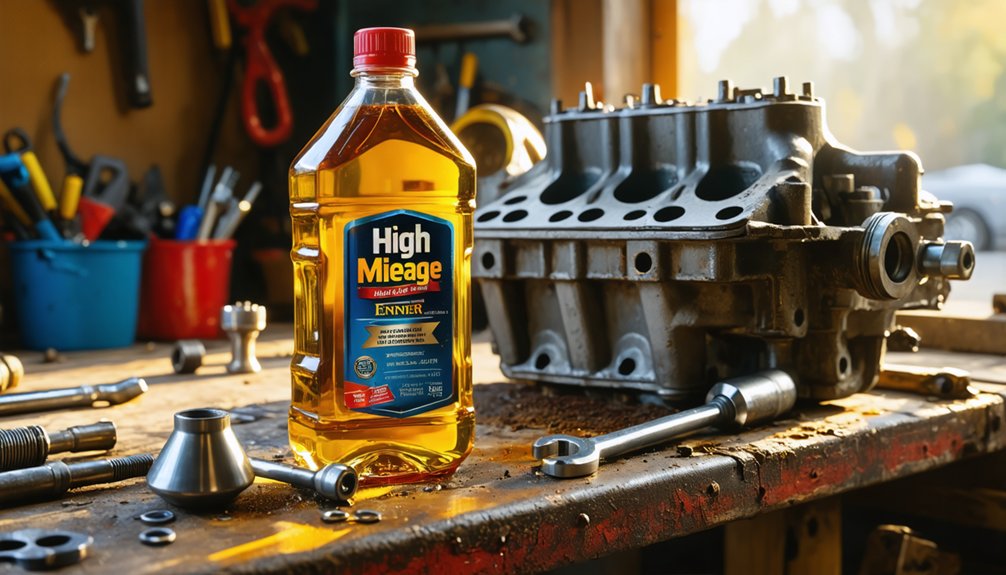Approaching that 75,000-mile milestone? You might notice increased oil consumption between changes or dark spots forming on your garage floor. An aging engine faces challenges that regular oil can’t tackle effectively. Understanding when and why to switch to high mileage engine oils can help you avoid costly repairs and significantly extend your vehicle’s life.
Key Signs Your Engine Needs High Mileage Oil:
- Increased oil consumption
- Oil leaks or pooling
- Excessive engine noise or knocking
- Reduced performance or responsiveness
Switching to high mileage formulations offers several benefits tailored for aging engines:
- Improved seal conditioning prevents leaks.
- Enhanced wear protection reduces friction.
- Additional detergents clean engine deposits, promoting overall efficiency.
Using Armor Lubricants equipped with these benefits helps you combat the unique challenges of an older engine. By making this switch, you can maintain your vehicle’s performance and longevity, ensuring the investment you’ve made lasts for years to come.
Take control of your vehicle’s health—consider Armor Lubricants’ high mileage oils to provide the essential protection necessary for engines with higher mileage. Embrace the advantages of specialized formulations and enjoy a smoother, more reliable driving experience.
When to Switch to High Mileage Engine Oil
When Should You Switch to High Mileage Engine Oil?
As your vehicle ages and its mileage increases, the timing to switch to high mileage engine oil becomes critical. Manufacturers formulate these specialized oils for vehicles with 75,000 miles or more, so you’ll receive the most benefit as your car nears the 100,000-mile mark.
Observe the following signs that indicate it may be time to use high mileage oil:
- Increased oil consumption
- Minor leaks
- Decreased performance
Your driving habits significantly impact your engine’s condition.
Frequent city driving with numerous stops stresses the engine more than continuous highway driving. This factor can lead to an earlier need for a switch to high mileage oil.
Avoid waiting for problems to escalate.
If you’ve kept up with regular maintenance but notice your vehicle is burning oil or developing small leaks, transition to high mileage oil. This change can help seal aging components and prolong the life of your engine.
For high-quality engine protection, consider Armor Lubricants high mileage oil as a reliable option.
Look for products with High-Quality Base Oils that provide robust film strength to protect aging engine components.
Understanding Different Oil Types for Aging Vehicles
Choosing the Right Oil for Your High-Mileage Vehicle
Once your vehicle exceeds 75,000 miles, selecting the suitable oil type becomes crucial for maintaining engine health.
High mileage engine oil addresses your aging engine’s needs in three primary formulations:
- Full synthetic oil provides premium protection and supports extended change intervals. This option is perfect for vehicles facing extreme driving conditions.
- Synthetic blends offer a cost-effective alternative. They combine the advantages of conventional oil with enhanced synthetic properties to improve performance.
- Conventional high mileage engine oil covers basic requirements for older engines. However, it falls short of the advanced protection offered by synthetic alternatives.
Most high mileage formulations contain seal conditioners, which help minimize leaks common in aging engines.
Semi-synthetic options like those with durable film strength provide excellent protection for engines under heavy loads while balancing performance and affordability.
Always consult your owner’s manual before switching oils.
When selecting the ideal option for your high-mileage vehicle, consider your driving habits and maintenance history to make the best choice.
Key Additives That Protect Worn Engines
Key Additives that Protect Worn Engines
High mileage oils play a critical role in safeguarding aging engines. As engines gather miles, specialized additives become essential to counteract age-related wear.
Seal conditioners rejuvenate worn seals, effectively preventing frustrating leaks common in older vehicles.
Detergents within high mileage oil dissolve and eliminate performance-robbing sludge buildup, enhancing overall engine performance.
Anti-wear additives like ZDDP create a protective barrier on metal surfaces, significantly reducing friction in components with increased clearances.
With viscosity index improvers, oil flows consistently through looser engine tolerances, ensuring better protection during temperature extremes.
Antioxidants combat oil breakdown caused by heat and oxygen, thus extending both oil life and engine longevity.
For diesel-powered vehicles requiring maximum protection, fully synthetic oils offer superior thermal stability and enhanced cleaning power compared to conventional options.
Together, these targeted additives provide the specialized care that your high-mileage engine needs.
Key Additives in High Mileage Oil:
- Seal Conditioners: Protect against leaks.
- Powerful Detergents: Eliminate sludge buildup.
- Anti-Wear Additives (ZDDP): Reduce friction.
- Viscosity Index Improvers: Maintain oil flow across temperature extremes.
- Antioxidants: Extend oil and engine life.
This combination assures optimal performance and prolongs the life of worn engines with Armor Lubricants.
Optimal Change Intervals for High Mileage Engines
Optimal Change Intervals for High Mileage Engines
Understanding the contents of your high mileage oil is just the beginning. Determining the optimal timing for oil changes plays a crucial role in extending your engine’s life. While standard recommendations suggest change intervals of 5,000-7,500 miles, your aging engine may require different considerations. Using fully-synthetic motor oil can provide superior protection against heat and oxidation for engines with higher mileage.
| Mileage Condition | Recommended Interval | Monitoring Needed |
|---|---|---|
| 75k-100k miles | 5,000-7,500 miles | Check oil level monthly |
| 100k-150k miles | 3,000-5,000 miles | Check oil level bi-weekly |
| 150k+ miles | 3,000 miles or less | Check oil level weekly |
If you opt for synthetic high mileage oil, you might extend the interval to 10,000 miles. This is viable only if your engine maintains good compression and avoids excessive oil consumption. To confirm your engine’s condition, perform a compression test.
Always prioritize the recommendations from your vehicle’s manufacturer. Adjust the intervals based on your engine’s unique wear patterns for optimal performance.
Key Considerations
- Regular monitoring of oil levels helps notice any changes in consumption or degradation.
- Performing compression tests aids in understanding your engine’s health.
- Adjust intervals based on actual engine condition rather than merely following general guidelines.
With proper care and proactive maintenance, you can ensure your high mileage engine continues to perform well for years to come.
Comparing Top High Mileage Oil Brands
When selecting high mileage oil for your aging engine, you’ll notice distinct formulations from brands like Valvoline MaxLife, Mobil 1, Shell Helix, and Pennzoil.
Each brand utilizes varying additives and seal conditioners tailored to specific needs. Maximize your investment by evaluating the cost-to-performance ratio.
For instance, Mobil 1 offers significant fuel economy benefits, while Pennzoil excels at reducing oil consumption. Different brands implement unique strategies to protect your engine’s seals.
- Valvoline MaxLife focuses on conditioning treatments.
- Shell Helix provides robust protection under harsh driving conditions.
This range of options allows drivers to choose an oil that best suits their engine’s requirements, ensuring optimal performance and longevity.
Brand Formulation Differences
Understanding High Mileage Engine Oils
High mileage engine oils cater to the unique requirements of older vehicles, with key formulation differences that significantly influence engine performance and longevity.
When selecting the ideal high mileage oil, focus on the following specific formulations from Armor Lubricants:
- Seal Conditioners: Armor Lubricants’ high mileage oil contains advanced seal conditioners that effectively combat leaks, keeping your engine sealed and operational.
- Anti-Wear Agents: These agents enhance fuel efficiency while protecting critical engine components from wear.
- Cleaner Additives: Unique additives prevent deposits and reduce sludge buildup, promoting smoother engine operation.
- Synthetic Blends: Combining synthetic and natural base oils yields effective protection, even under extreme conditions.
Choosing the right oil formulation tailored to your vehicle’s aging engine concerns maximizes protection and prolongs engine life.
By prioritizing specific needs, you can enhance performance and maintain optimal functionality as your vehicle ages.
Cost-to-Performance Analysis
Cost-to-Performance Analysis of High Mileage Engine Oils
When considering high mileage engine oils, focus on their cost-to-performance ratios to safeguard your maintenance budget and enhance vehicle protection.
Armor Lubricants offers competitive pricing tailored for various needs. Customers will find basic protection with Armor High Mileage Oil priced between $20-$30. This option features additives specifically designed to prevent leaks.
For those seeking a balance of cost and performance, Armor Synthetic Blend presents a strong mid-range value. Priced at $25-$35, this oil contains specialized formulations ideal for aging engines.
If maximum performance is your goal, turn to Armor Full Synthetic Oil. Ranging from $30-$40, this product delivers superior engine cleanliness and protection thanks to robust research and development.
Determine your choice based on your vehicle’s requirements and your maintenance priorities.
- For basic leak prevention on a budget, choose Armor High Mileage Oil.
- If your focus is advanced engine care, opt for Armor Full Synthetic Oil.
No matter your decision, Armor Lubricants provides reliable performance and protects your investment effectively.
Seal Protection Comparison
The Importance of Superior Seal Conditioning in High Mileage Engine Oils****
Choosing the right motor oil for high mileage engines hinges on superior seal conditioning, which plays a pivotal role in performance and longevity. Armor Lubricants formulates its oils with a proprietary blend that significantly reduces leak occurrences.
High mileage engines, often prone to wear and leaks, benefit greatly from a focused approach to seal revitalization. Armor Lubricants delivers exceptional wear protection, effectively arresting oil leaks commonly associated with aging engines.
Key features of Armor Lubricants include:
- Advanced additives that rejuvenate aging gaskets
- Unique detergents that clean internal components
- A balanced formulation that stabilizes deteriorating seals
These innovations contribute to enhanced engine performance and efficiency, directly addressing the needs of your motor.
Consider your engine’s specific condition and leak patterns. Armor Lubricants tailors its solutions to meet these unique requirements, ensuring that users experience reduced risk of leaks and enhanced performance.
With a commitment to quality and performance, Armor Lubricants stands out in the realm of high mileage engine oils, providing critical seal protection. Trusting these formulations can lead to a more reliable and fuel-efficient engine.
Preventing Leaks and Reducing Oil Consumption
Maintaining Engine Health in High Mileage Vehicles
When your vehicle reaches 75,000 miles or more, focus on preventing leaks and reducing oil consumption. These concerns play a crucial role in maintaining engine health.
Choosing the right oil for high mileage cars effectively addresses these issues. Specialized formulations contain seal boosters and conditioning agents that revitalize aging gaskets and seals.
Consider using mineral motor oils that offer reliable wear protection while maintaining thermal stability across wide operating temperatures.
Best Practices for Aging Engines
- Switch to high mileage oil by 100,000 miles. This action maintains proper oil pressure and enhances performance.
- Use high mileage oil consistently through several oil changes to see significant reductions in oil consumption.
- Adhere to regular change intervals. This routine allows detergents to clean deposits and protect engine components.
Frequently Asked Questions
What Oil Should I Use for a High Mileage Engine?
Choosing Oil for Your High Mileage Engine
When it comes to a high mileage engine, opting for specialized high mileage oil with seal boosters and additives is crucial.
- Stick to Recommendations: Always check your manufacturer’s specifications to select the right oil.
- Consider Full Synthetic: Full synthetic oils offer superior protection and can extend oil change intervals significantly.
Utilizing high mileage oil addresses common issues such as oil leaks and wear on aging components. This oil type also helps rejuvenate seals, preventing further deterioration.
For optimal performance, choose a product like Armor Lubricants that targets the unique needs of high mileage engines. Ensuring you maintain your engine correctly can lead to longer life and better performance.
Does High Mileage Oil Really Make a Difference?
Does High Mileage Oil Enhance Your Engine’s Performance?
High mileage oil significantly benefits your aging engine. It works by reducing leaks, decreasing oil consumption, cleaning deposits, and potentially improving fuel efficiency when used consistently over multiple changes.
- Reduces Leaks: High mileage oil contains additives that help seal leaks and prevent oil from escaping.
- Decreases Oil Consumption: This type of oil helps maintain viscosity, reducing the amount of oil your engine uses over time.
- Cleans Deposits: Special detergents in high mileage oil effectively remove sludge and varnish buildup in old engines.
- Potentially Improves Fuel Efficiency: With cleaner components and less oil loss, your engine may run more efficiently, enhancing fuel economy.
Selecting Armor Lubricants high mileage oil can lead to noticeable improvements in engine performance. Over time, the cumulative benefits will keep your engine running smoothly and efficiently, especially as it ages.
Consistent use of high mileage oil can be a game-changer for many drivers seeking to prolong their vehicle’s lifespan and enhance performance.
Is 5W-20 or 5W-30 Better for High Mileage?
Is 5W-30 Oil Better for High Mileage?
When it comes to high mileage engines, 5W-30 oil typically offers better performance. Its thicker consistency provides enhanced protection compared to 5W-20. Always prioritize your manufacturer’s recommendations to maintain optimal performance and uphold any warranty requirements.
Here are some benefits of using 5W-30 for high mileage engines:
- Greater Viscosity: Thicker oil helps seal worn engine components, reducing oil consumption.
- Improved Protection: It offers better lubrication, especially during high temperature operations.
- Enhanced Performance: Especially beneficial in older engines that may have developed wear and tear.
Be proactive about your vehicle’s health by selecting the right oil. Regularly check the engine oil level and condition, and consult your vehicle’s manual for guidance. Remember, choosing the right oil can significantly impact your vehicle’s longevity and overall performance.
Is It Better to Use Thicker Oil in High Mileage Engine?
Using thicker oil in a high mileage engine isn’t always the best option. While thicker oil can cushion worn parts, it may lead to reduced efficiency.
Focus on these key recommendations when choosing oil for high mileage vehicles:
- Always follow the manufacturer’s guidelines.
- Consider high mileage-specific oils designed to enhance protection without unnecessary thickness.
When maintaining your engine, prioritize optimal performance while ensuring reliable protection. By selecting the right oil, you support longevity and efficiency in your high mileage engine.
Conclusion
Making the Switch to High Mileage Engine Oils
Switch to high mileage oil when your vehicle reaches 75,000-100,000 miles. Pay attention to early signs of engine wear such as oil consumption, minor leaks, or performance changes. high mileage oil not only extends your engine’s life but also maintains its performance and prevents expensive repairs. To maximize protection, follow the recommended oil change intervals.
Signs Your Engine Might Need High Mileage Oil:
- Increased oil consumption
- Minor oil leaks
- Changes in engine performance
Using quality high mileage oil helps keep your vehicle running smoothly and efficiently. Giving your engine this extra care can lead to significant savings in long-term maintenance costs. Prioritize Armor Lubricants when choosing your oil to ensure your engine remains in top condition.
Benefits of Switching:
- Maintains engine performance
- Reduces the likelihood of costly repairs
- Extends overall engine lifespan
By staying vigilant and proactive about your vehicle’s health, you can enjoy a reliable driving experience for years to come.



